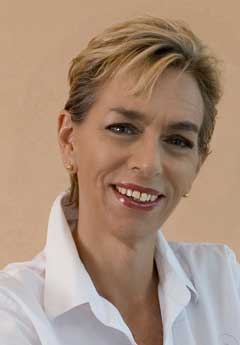Puerto Vallarta, Mexico - Price. Quality. Technology. That was the triple message Dr. Octavio Gonzalez had for attendees of the Medical Matters 2014 conference held last week in Puerto Vallarta, Mexico. The veteran dentist was among dozens of exhibitors at an event catering to expatriates, snowbirds and tourists in the Mexican coastal city.
Gonzalez estimated that 95 percent of his customers hail from the United States, Canada and Europe, mostly from North America. "Under the worst scenario," Gonzalez told FNS, the prices of his Dental Avant Garde company might reach a third of comparable costs in the U.S. and Canada. Gonzalez's firm specializes in dental implants and full mouth functional rehabilitation.
Apart from pocketbook savings, a visit to Dental Avant Garde has other advantages over seeing a dentist north of the border, Gonzalez insisted.
"Many of the dentists in the states don't have the same technology we have. We have Swiss and German and French technology," he said. "The materials are the finest on the world market."
 |
Adriana Ramirez, spokeswoman for the Amerimed hospital, said patients at the three-year-old facility can expect to pay 70 percent or less than in the US. Ramirez said the patient rolls change seasonally, with foreigners making up the majority of admissions from about November to April and Mexican nationals filling in the rest of the year.
For her part, Dr. Norma Carrion said she was actively seeking more foreign patients, who currently constitute 5 to 10 percent of her patient load, as well as donors for grants to assist children with problems like cerebral palsy.
Carrion's Clinica de Rehabilitacion Vallarta-Santa Barbara, or Vallarta Rehabilitation Clinic, is a non-profit organization that offers treatments for half the cost of private businesses, according to the specialist.
Working in an internationally-popular tourist destination can sometimes be a challenging task, the bilingual Spanish-English speaker said, recalling occasions when Carrion and her assistant were forced to communicate with and treat French speakers from Quebec via sign language.
Healthcare-related concerns come up often in the work of Puerto Vallarta's U.S. Consular Agency, said Consular Agent Kelly Trainor. "We do help people find adequate medical facilities in the event of medical emergencies," Trainor said.
In addition, the Consular Agency distributes informational sheets on issues like dengue fever, which occurs in Puerto Vallarta and other tropical zones.
Trainor urged potential visitors to plan ahead and consider possible medical contingencies and insurance coverage before coming to Mexico.
The brisk turnout for Medical Matters 2014 was a sign of Puerto Vallarta's rebounding tourism this winter high season, as well as the growth of the expatriate population. Although the final numbers are not yet in, many of Puerto Vallarta's restaurants are packed with foreigners, cruise ship visits are up and some business persons report the best season in years.
 |
"I haven't had room for everybody," Thompson told FNS. "I've had to turn so many people away from the (presentation) rooms." According to Thompson, she's seen a "record" year of doubling in the number of consultations, admissions and surgeries performed by the more than two dozen doctors with whom she works. Asked whether the Affordable Care Act in the US impacted medical tourism in any way, Pamela said that at least in Puerto Vallarta, the field "hasn't seemed to decrease at all with Obamacare."
In a recent story, the Mexican daily La Jornada reported that Mexico is number two in the global ranking of medical tourism, falling only behind Thailand.
Official numbers cited by the newspaper reported that approximately 1,000,000 residents of the U.S alone, mainly persons of Latino heritage from California, Arizona and Texas, seek medical assistance in Mexico.
Earnings from medical tourism reportedly jumped from $1.5 billion in 2006 to $2.85 billion in 2013, with an annual projected growth rate in the ballpark of 7 percent.
The market is so promising, La Jornada reported, that Mexico's Economy Secretariat is pitching medical tourism as a good niche investment for foreign capitalists, alongside the auto, mining and aerospace sectors.
 |
Carlos Alaniz also views great potential for the sector of Mexican health care serving the foreign-born. Brought up in El Paso, Texas, Alaniz moved to Seattle 25 years ago, where he pursued a career as an occupational therapist. While he still lives full-time in Seattle, Alaniz maintains a home he purchased in Puerto Vallarta nine years ago.
"(Puerto Vallarta) is a great town," the former borderlander said. "It's a vibrant community - both the local community and expats. I think there is mutual respect. I have friends like me who are thinking about moving down here."
Alaniz said he was considering getting certified in Mexico so he can practice his profession and spend time volunteering, perhaps teaching CPR to others who can "save lives."
"As a therapist, I can work for a temp agency and earn good money in Seattle and work for 6 months and come here and not work so much," he said.
"They are off to a good start," Alaniz said of Puerto Vallarta's healthcare infrastructure. "But there are a lot of services that can be expanded. For example, they don't have a hospice here. There needs to be more clinics."
Alaniz said a future growth area rests with what he termed "continuum of care," or the systemic linking of independent, assisted and nursing home living for the elderly, a booming slice of the North American population.
"I think there will be a great opportunity to do it here," Alaniz added. "People in the states are paying a lot of money for that and for probably a fraction they can come here."


